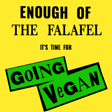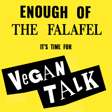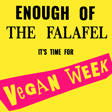
220- Humans have created this problem, so it's up to humans to...
Sort it out? Or stay the heck away! In this week's pod, we put the spotlight on New Zealand's attempts to go 'predator free' by 2050 to help out their 'native' flora & fauna...by destroying more-or-less everything else. A complex issue, with no real winners, but certainly an interesting context to ponder. As well as this story, Mark, Shane & Anthony discuss six other bits of news from the vegan & animal rights space over the last seven days across the world.
****************
Enough of the Falafel is a community of people who love keeping on top of the latest news in the world of veganism & animal rights. With the Vegan Week podcast, we aim to keep listeners (& ourselves) informed & up-to-date with the latest developments that affect vegans & non-human animals; giving insight, whilst staying balanced; remaining true to our vegan ethics, whilst constantly seeking to grow & develop.
Each week we look through news stories from the past 7 days in the world of veganism & animal rights.
If you spot any news stories that might catch our fancy, or have an idea for a discussion topic, get in touch via enoughofthefalafel@gmail.com.
*******************
This week's stories:
https://economictimes.indiatimes.com/news/international/us/nearly-60-americans-eat-vegetarian-or-vegan-meals-says-study-check-the-difference-between-vegetarian-and-vegan-diet-and-the-key-reasons-driving-change-in-eating-habits-across-the-us/articleshow/125107683.cms?from=mdr
https://isthmus.com/news/news/animal-rights-activists-score-big-win-in-ridglan-farms-case/
https://abcnews.go.com/International/wireStory/years-after-argentina-shut-notorious-zoo-stranded-animals-127041563
https://www.dailymail.co.uk/news/article-15260437/Vets-quitting-trauma-having-dogs-shortages-nations-health-risk.html
https://www.farminguk.com/news/union-urges-farmers-to-stay-vigilant-as-activist-threats-resurface-online_67495.html
https://www.majorcadailybulletin.com/news/local/2025/11/04/137781/investigations-continue-into-the-deaths-hunting-dogs-animal-protection-law-mallorca-blamed.html
https://www.npr.org/2025/09/08/nx-s1-5507110/new-zealand-conservation-experiment
https://www.nytimes.com/2025/11/05/science/iguanas-mexico-invasive-species.html#:~:text=Reptiles%20on%20a%20Mexican%20island,hundreds%20of%20thousands%20of%20years.&text=On%20a%20Mexican%20island%20in,seafaring%20ancestors%20has%20been%20vindicated.
Also see...
https://www.theanimalreader.com/2025/11/04/us-senate-rejects-effort-to-stop-plan-to-kill-450000-barred-owls/ which is from this week & has a similar flavour to our main story from NZ.
****************
Thanks everyone for listening; give us a rating and drop us a message to say "hi"; it'll make our day!
Mark, Shane & Ant


